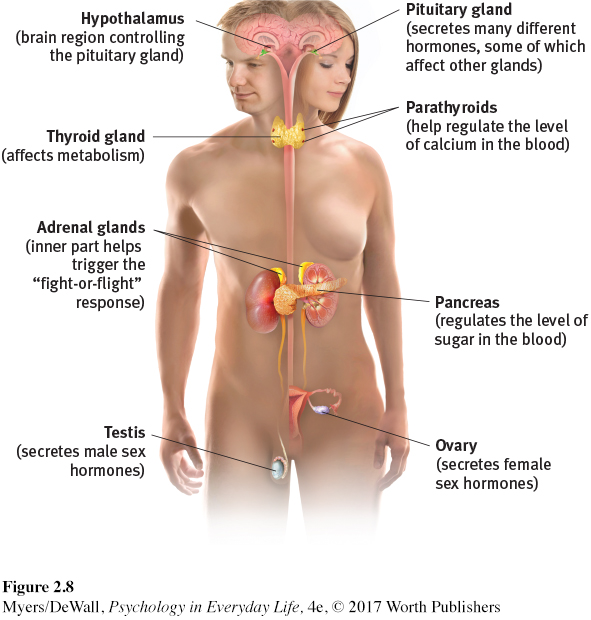2.4 The Endocrine System
LOQ 2-
endocrine [EN-
hormones chemical messengers that are manufactured by the endocrine glands, travel through the bloodstream, and affect other tissues.
So far, we have focused on the body’s speedy electrochemical information system. But your body has a second communication system, the endocrine system (FIGURE 2.8). Glands in this system secrete hormones, another form of chemical messenger. Hormones travel through our bloodstream and influence many aspects of our life—

Some hormones are chemically identical to neurotransmitters. The endocrine system and nervous system are therefore close relatives. Both produce molecules that act on receptors elsewhere. Like many relatives, they also differ. The speedier nervous system zips messages from eyes to brain to hand in a fraction of a second. Endocrine messages trudge along in the bloodstream, taking several seconds or more to travel from the gland to the target tissue. The nervous system transmits information to specific receptor sites with text-
adrenal [ah-
But slow and steady sometimes wins the race. The effects of endocrine messages tend to outlast those of neural messages. Have you ever felt angry long after the cause of your angry feelings was resolved (say, your friend apologized for her rudeness)? You may have experienced an “endocrine hangover” from lingering emotion-
pituitary gland the most influential endocrine gland. Under the influence of the hypothalamus, the pituitary regulates growth and controls other endocrine glands.
The endocrine glands’ control center is the pituitary gland. This pea-
Pituitary secretions also direct other endocrine glands to release their hormones. The pituitary, then, is a master gland (whose own master is the hypothalamus). For example, under the brain’s influence, the pituitary triggers your sex glands to release sex hormones. These in turn influence your brain and behavior.
This feedback system (brain → pituitary → other glands → hormones → body and brain) reveals the interplay between the nervous and endocrine systems. The nervous system directs endocrine secretions, which then affect the nervous system. In charge of this whole electrochemical orchestra is that master conductor we call the brain.
Retrieve + Remember
Question 2.9
•Why is the pituitary gland called the “master gland”?
ANSWER: Responding to signals from the hypothalamus, the pituitary releases hormones that trigger other endocrine glands to secrete hormones, which in turn influence our brain and our behavior.
Question 2.10
•How are the nervous and endocrine systems alike, and how do they differ?
ANSWER: Both of these communication systems produce chemical molecules that act on the body’s receptors to influence our behavior and emotions. The endocrine system, which secretes hormones into the bloodstream, delivers its messages much more slowly than the speedy nervous system, and the effects of the endocrine system’s messages tend to linger much longer than those of the nervous system.